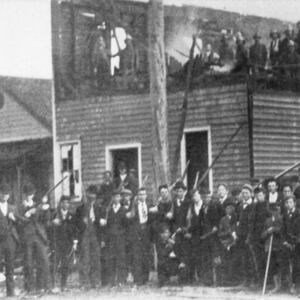On July 22, Chairman Bennie Thompson announced the senior staff for the fledgling 1/6 committee. On paper, the choices were beyond reproach. Until you saw who was named staff director, and just how sketchy his professional past is.
Thompson’s announcement described David Buckley in glowing terms. He was staff director of a congressional intelligence committee, showing that he was not afraid to go up against the most recalcitrant of executive branch agencies. That kind of experience will be invaluable.
He was even the Inspector General of the Central Intelligence Agency. You can’t ask for a better background than that.
Unless you look at what he did, which Yahoo News’ Jenna McLaughlin, among others, did. Twice. While he was CIA IG, Buckley pushed so hard to prioritize criminal prosecution that a senior investigator falsified evidence to give to federal prosecutors in the Eastern District of Virginia. It placed that office in the unfortunate position of having to ask a judge to vacate a guilty plea once the misconduct was discovered, which then prompted that office to outright refuse to accept any more cases from the CIA IG because he and his team were considered untrustworthy.
As part of a larger scheme to cover up the incident, Buckley then attempted to identify and discredit the whistleblowers in his own office who blew the whistle on the falsification. He openly retaliated against several of his own employees, most notably an attorney investigator named Andrew Bakaj, who incurred his wrath by cooperating with an investigator from the Intelligence Community Inspector General (ICIG), as the law requires. Buckley attempted to torpedo Bakaj’s career for the unforgivable sin of interfering in his turf war with the ICIG—a turf war that the ICIG never even knew it was fighting. He even went so far as to hold an office-wide meeting in which he all but prohibited any employee of the CIA Office of the Inspector General from talking to the ICIG.
And this isn’t just me—or even Bakaj—talking. Most of these charges were substantiated in an independent investigation conducted by the Department of Homeland Security Inspector General. After that investigation, the DHS IG found Buckley’s conduct so objectionable that he recommended to the CIA director that Buckley be subjected to a review of his security clearance; that’s a professional kill-shot if it’s taken away, which in this scenario would be entirely justified.
The CIA has not taken any action in response to the DHS IG report. This isn’t to say that the CIA declined to take action; the agency has not decided what to do. This means that, as of today, there is still an active suggestion from an inspector general that Buckley’s security clearance be revoked. It’s a Sword of Damocles hanging over Buckley’s head. I and others have written extensively before about the totally arbitrary system currently governing security clearances, and this is exactly the system in charge of Buckley’s fate.
So there’s going to be an unspoken implication—whether correct or not—that the committee’s staff director will continue to have a security clearance only so long as he does not anger the intelligence community. And even if he does not need a security clearance to be the committee’s staff director—which would be very unusual given the mandate—he would definitely be expected to do anything he could to avoid having it revoked, since that would severely constrain his post-committee career options.
The only way that Buckley could resolve this issue would be if he recused himself from any decisions involving law enforcement or national security. At which point, if he’s not allowed to make any decisions involving the very areas of specialization he was hired for, what exactly makes him a good choice for staff director?
Buckley’s Presence on the Committee Is a Gift to Its Opponents
When Chairman Thompson announced the appointment of David Buckley, he committed a massive, unforced error. Various Republican offices will no doubt rediscover a profound support for brave whistleblowers, which was inexplicably absent over the last four years, and they will go out of their way to highlight Buckley’s previous declarations that other investigators needed to “stay in their lane” and not question him or his, all in furtherance of their agenda of tarnishing the committee’s findings before they even get off the ground. Buckley’s presence on the committee opens up the very real possibility that witnesses’ testimony will be undercut because detractors will complain, “Buckley’s office falsified evidence to federal prosecutors.” Those same detractors will intimate that Buckley is “too afraid” to look into frivolous allegations of law enforcement misconduct because of his precarious security clearance position. It’s a foregone conclusion that the Republican game plan will be to undermine the committee at every step, and when Chairman Thompson appointed Buckley, he handed the Republicans the ball.
By all impressions, all of Chairman Thompson’s other appointments are known to be aggressive, persistent investigators, out to determine the truth no matter what the obstacles. Left to their own devices, I am confident that they would do a remarkable job. But Buckley is unlikely to leave them to their own devices. He has demonstrated a penchant for micromanaging the people underneath him, as aptly demonstrated by his handling of the Bakaj matter. He could not stomach the idea of his staff cooperating with another office, and so he personally held a meeting to tell them that. When confronted with evidence of misconduct by a member of his office, he chose to pursue the whistleblowers. It does not take much imagination to conclude how he will handle a highly qualified staff of bulldogs if he decides they need to turn down the heat. And even if this is discovered later when he actually crosses the line, his termination at that time will cause significant damage to the credibility of the committee.
On a related note, it is important to remember why he went after Bakaj. It wasn’t just for reporting misconduct, although that definitely played a role. It was primarily for interfering in a turf war. For giving the ICIG reason to believe that they had a role to play—which, ironically, he told them himself with a smile before blowing up after they walked out the door. How do you think he is going to handle relations with other entities who are also investigating the 1/6 insurrection? As for the other officers who were in part hired because of their ability to work with those entities, how do you think they will fare?
In the final analysis, Chairman Thompson has a clear choice to make. It is early enough in the process that he can be forgiven a misstep which can easily be chalked up to someone not doing their homework or believing a sincere-sounding civil servant who told a sob story about disgruntled employees out to stop him from Enforcing Justice. But if Buckley stays, the committee’s credibility will be irrevocably damaged before its first hearing. It might still achieve its goals if everything else lines up in its favor, but there is a significant chance it will not. And this investigation is too important, too critical to the future of our country to run that risk, especially over one staffing decision.








